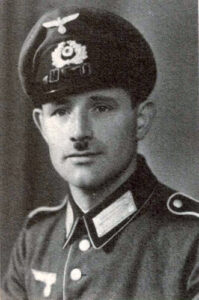Mail Correspondence with Soldiers at War (“Feldpostbriefe”): Last letter of German soldier Jakob Stöcker from Russia, 4 January 1944 (Published on 07/08/2024)
Feldpostbriefe and their significance today
When researching Julius Erasmus, one inevitably comes into contact with letter correspondence between soldiers at war and their families from the time of the Second World War, such correspondence being called “Feldpostbriefe” in German. Be it messages about the death of a soldier, written by his superior to his relatives, which were later sent to Mr Erasmus as a hint for a grave search, or other correspondence between soldiers at war and their families at home. Since then, I have also been dealing more closely with field post letters from that time.
Feldpostbriefe are valuable contemporary documents that unfold their timeless message, especially in times like the present, and convey a vivid impression of what war means to all involved. They are a valuable tool to ward off the very beginnings of a renewed striving for war and perhaps to help prevent history from repeating itself once again and with yet more gruesome consequences for mankind. At present, war, weapons and the killing of people on a large scale are once again being drummed up forcefully, although for decades one could have had the vague hope that mankind had finally learned its lesson to some extent from the painful experiences of two world wars in particular. Unfortunately, this does not seem to be the case once again.
With this in mind, appropriate letters or letter excerpts from various sources will be published here from time to time in the section “Mail Correspondence with Soldiers at War (Feldpostbriefe)” as a reminder of what war means to man and mankind. To provide food for thought and in the unshakable hope that this may make a difference.
Last Feldpostbrief from Private Jakob Stöcker to his family, dated 04/01/1944 (source: Volksbund Deutsche Kriegsgräberfürsorge, Letzte Lebenszeichen – Briefe aus dem Krieg, p. 198 f. (translation from German language)):
“In the field, 04/01/1944
My dear ones at home!
Another heavy, dark night has come to an end and so I would like to give you a sign of life again. We expected a big attack this night, but it didn’t happen, but it won’t fail to materialize and I’m almost devoid of hope. The Russians outnumber us by a factor of 8 to 10, and they have all the heavy weapons, which we lack completely. Plus the daily airplane attacks and we can’t even fend them off. If the Russians were as good a soldier, i.e. as well trained as the Germans, we would have been lost long ago. But one day he’ll cut us off and take us, then we’ll wander off to Siberia if we don’t have a cold ass by then. It’s horrible to be in this situation and to look to the future, because this Crimea won’t be sustainable.
Yes, the 98th Division has always [had] difficult tasks to fulfill, first at the middle section, then at the Kuban bridgehead, where it has gotten out still rather well, and now at the bridgehead near Kerch, but whether we will be able to get out this time is questionable. I can tell you the sad news that the third comrade was reported missing tonight. So only me and Ignatz are still here from us old ones. He went to get food and never came back. Maybe a bullet hit him and [he] had to lie down without help. How many times have I made the same journey, all night long carrying bunker wood and ammunition or fetching food and the bullets just whistled past my ears, but I was always lucky. But the jug goes to the well until it breaks. But you become so indifferent that you say to yourself: if it hits [you], then you’ll be relieved of all torment.
Otherwise I’m still healthy, which I hope you are too, and I’m eagerly awaiting mail, but I’ll have to be patient for a while yet. So we hope and believe in a miracle, because only this could save us, and we ask the Almighty to grant us a healthy reunion. Greetings and kisses for today from your dear dad. Greetings to all.
‘Auf Wiedersehen!'”
Private Jakob Stöcker, born on 21/10/1907, was reported missing on 19/01/1944 near Jurakow-Kut, Crimea. Nothing is known about his whereabouts to this day.
(Head picture: Helenenberg Monastery German Military Cemetery
near Welschbillig, November 2023)
If you wish to support my work, you can do so here. Many thanks!


